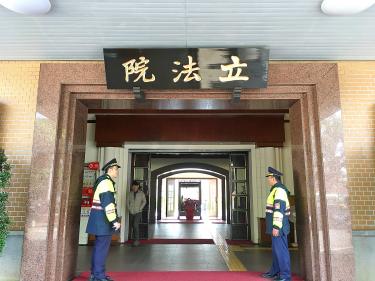President Tsai Ing-wen (蔡英文) yesterday said that her administration would push an initiative through the Legislative Yuan that would outlaw the activities of “Chinese communist surrogates.”
The legislation would strictly regulate activities by people, groups or institutions that could undermine national security by spreading Chinese propaganda, making statements on Beijing’s behalf, or participating in official events hosted or organized by China, Tsai said on Facebook
The proposal is to be introduced when the legislature begins its new session in September, she said, adding that she hopes it could pass before the end of the session.
Tsai also expressed gratitude to lawmakers for passing amendments to the Act Governing Relations Between the People of the Taiwan Area and the Mainland Area (台灣地區與大陸地區人民關係條例) on Wednesday.
Retired officers who held the rank of major general or above and civil servants of vice ministerial rank or above are prohibited from divulging state secrets or attending official events held by China, she said.
Penalties stipulated by the amended act include the revocation of pensions or fines of up to NT$10 million (US$321,471), she added.
Taiwan is a free nation where people can form different political beliefs, and most veterans are patriotic and rightfully enjoy their pensions, Tsai said.
However, a minority of generals should not be allowed to travel to China to sing the Chinese national anthem or salute the communist flag, as such actions are detrimental to Taiwan’s interests and dignity, she said, adding that such people deserve the “severest penalties” under the law.
Democratic Progressive Party (DPP) lawmakers have agreed to set additional amendments to the act that Tsai’s administration has proposed as a legislative priority for the upcoming session, sources said.
An additional clause to Article 33 would stipulate penalties for people, groups or institutions that have acted against Taiwan’s national security or social stability as surrogates of the Chinese Communist Party, the Chinese government or China’s armed forces, they said.
Another clause would stipulate penalties for spreading Chinese propaganda, attending events held by Chinese officials or making joint statements with the Chinese government if those activities are deemed harmful to Taiwan’s national security or conducted on China’s behalf, they added.
The sources did not disclose details about proposed penalties, but described them as severe.
DPP Legislator Kuan Bi-ling (管碧玲) confirmed that the amendments have been sent to the appropriate committee for deliberation.
Chinese Nationalist Party (KMT) caucus whip William Tseng (曾銘宗) was noncommittal, saying that the KMT’s disposition depends on whether the legislation is a genuine boost to national security or an electoral stratagem of the DPP.
“The KMT will oppose to the last any law that exceeds that which is necessitated by national security,” he added.
Additional reporting by Su Fun-her and Chen Jen
Source: Taipei Times - 2019/07/06





















